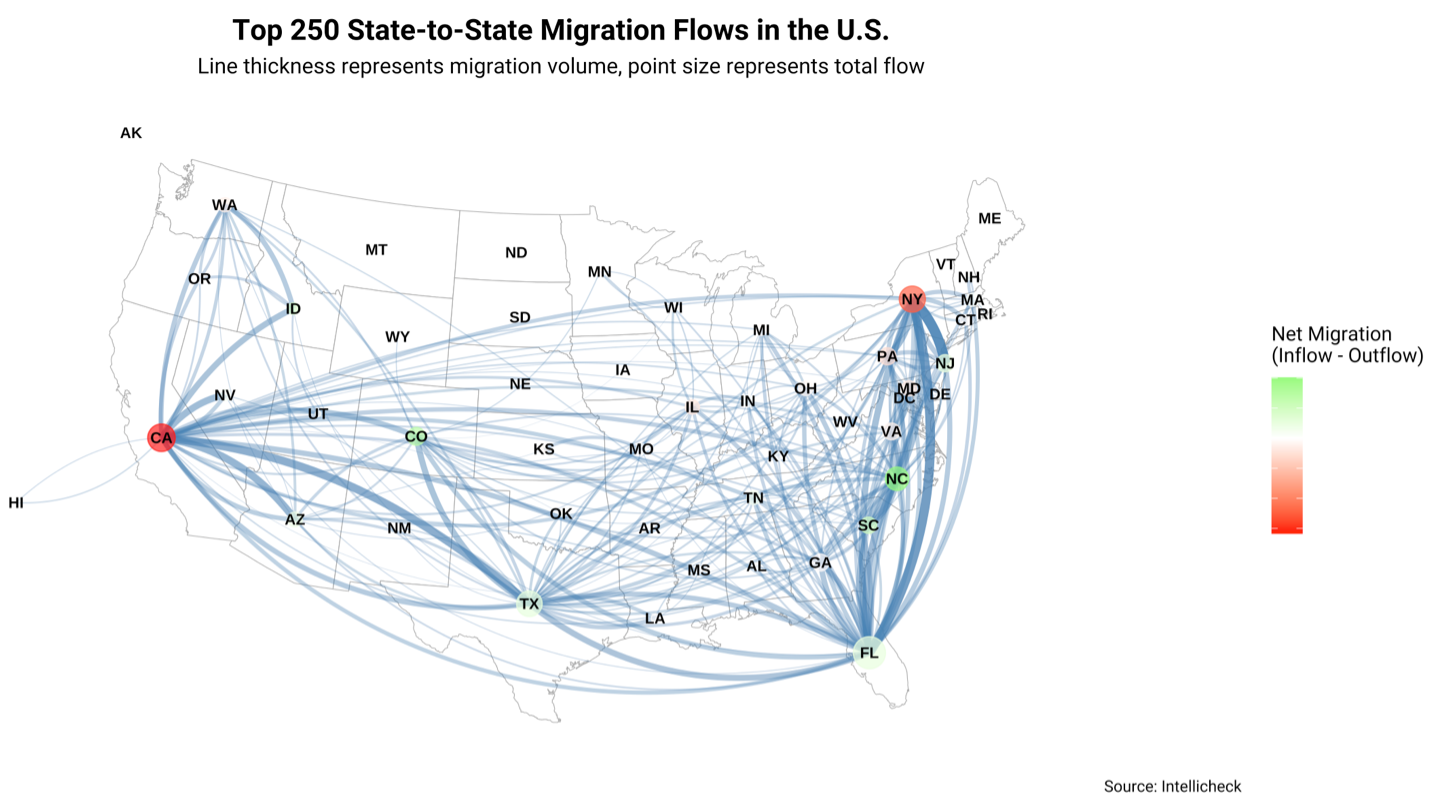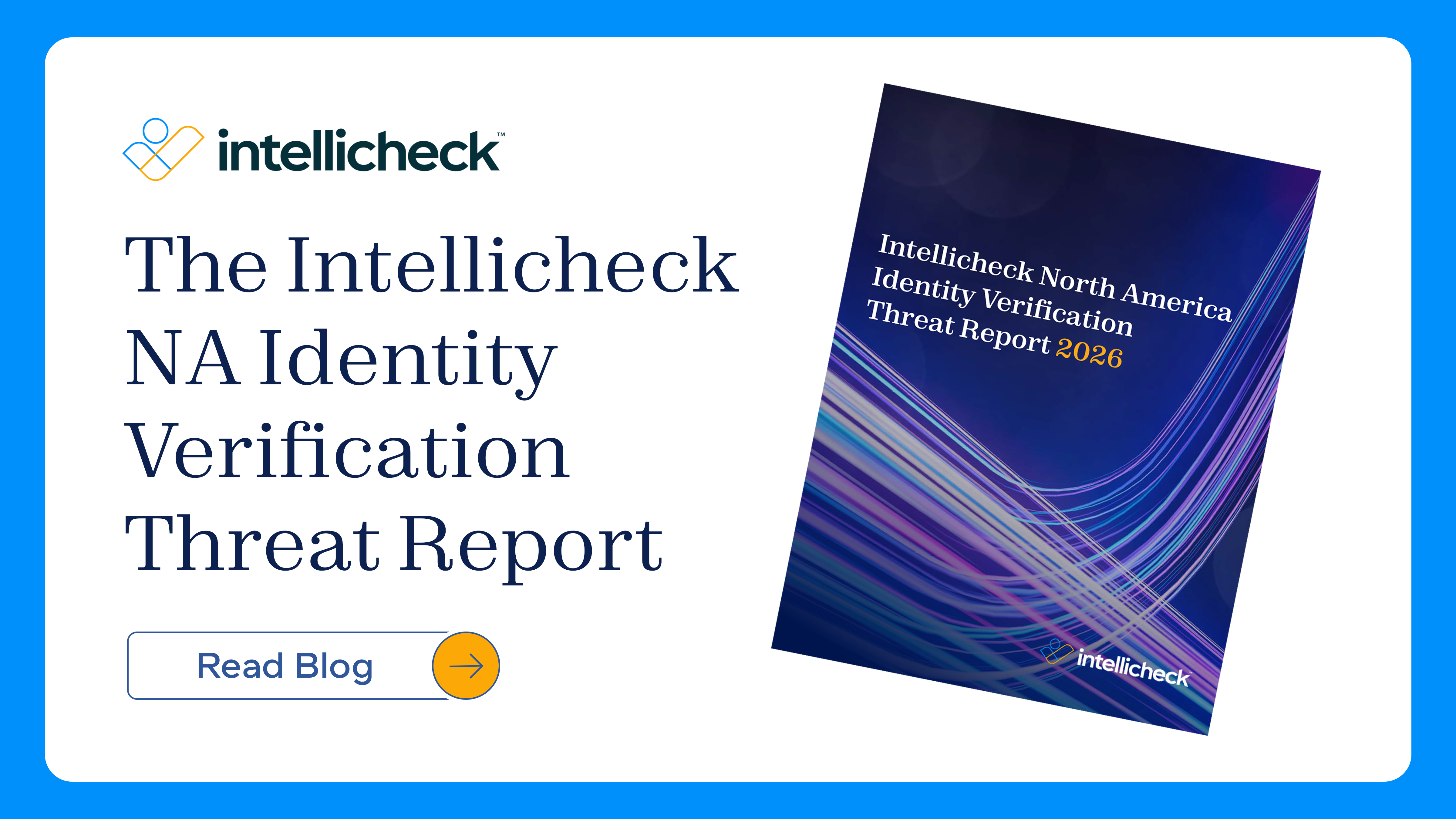Millions of Americans pack up their lives and move to a new state every year. Some chase better jobs, others want to be closer to family, and plenty just want sunshine or a lower cost of living. Whatever the reason, moving has become one of the defining trends in America today.
But here’s something most of us don’t think about: moving isn’t just about a new home, a new driver’s license, and unpacking boxes. It also increases the risk of identity theft.
At Intellicheck, we analyzed the top 250 state-to-state migration flows to understand where Americans are moving from and to, and the opportunities these shifts create for fraudsters. What we discovered makes it clear: relocating is one of the most vulnerable times for your identity to be stolen.
Relocation Opens Opportunities for Identity Fraud
Consider everything you need to update when you move and how long it takes to finish all these tasks:
- Your driver’s license
- Health insurance
- Bank and credit card accounts
- Employment records
- Dozens of online accounts tied to your personal details
That flurry of updates isn’t just overwhelming for you—it also generates systemic fraud detection noise and confusion that criminals attempt to exploit.
Common relocation patterns create expected digital footprints that fraud detection systems are less likely to flag as suspicious. Attackers often mimic or exploit these expected patterns. Identity verification systems like Intellicheck must understand these relocation patterns and exploitation tactics to spot potential identity fraud early and accurately.
Americans On the Move
Intellicheck performs about 100 million identity verifications annually across North America, providing valuable insights into Americans' relocation patterns. The map below visualizes Intellicheck data, illustrating the top 250 migration flows between states.

Understanding American migration isn't just useful for urban planners and real estate agents; it’s also a powerful tool for defending against identity theft.
- Outbound states: California, New York, and Illinois—once magnets for newcomers—are now leading the nation in people leaving.
- Inbound states: Florida, Texas, and Arizona are seeing massive inflows, driven by better weather, lower taxes, lower cost of living, and retirement.
- Regional loyalty: Many people move within regions. West Virginians head to Ohio, North Carolina, and Virginia. Those starting in Kansas tend to move to Missouri, Colorado, or Texas. Minnesotans often leave for Wisconsin, Colorado, or Florida.
- State highlights:
- Idaho is booming with transplants from Washington, Oregon, and California looking for affordable housing.
- Nevada attracts Californians looking for lower taxes and a lower cost of living.
- Colorado pulls from both coasts with its lifestyle appeal.
- Florida is America’s biggest draw—especially for people leaving the Northeast and Midwest.
Relocation Risk Considerations and Identity Verification
Understanding relocation patterns plays a key role in fraud detection by providing context for legitimate changes in personal information. Fraud detection systems can use these patterns to differentiate between statistically probable life events and suspicious behavior.
For example:
- Legitimate: A move from New York to Florida, and your accounts updated accordingly, doesn’t raise any high-risk signals.
- Suspicious: An ID is used in person in New York and California almost simultaneously, indicating a high risk of identity theft or synthetic ID fraud.
- Questionable: ID verifications with a Wyoming address claiming a recent move to Illinois are atypical and could be considered a medium risk. A business can ask for additional verification or use other signals (such as cell phone location) to assess risk further.
Using various fraud models with real-world relocation data improves fraud detection accuracy and helps reduce false positives that might upset legitimate customers who recently moved.
Protecting Your Identity While You Move
Taking proactive steps can significantly reduce your risk of identity fraud. Recommended actions to take:
- Update Your Address Everywhere: Don’t rely only on mail forwarding—directly inform any organization that sends you sensitive information. Fill out the change of address form with USPS and update your contact details with banks, credit cards, retirement accounts, utility companies, and others.
- Safeguard Sensitive Documents: Keep all critical documents, such as Social Security cards, financial statements, tax records, and birth certificates, with you during the move. This includes digital devices like laptops, which contain sensitive data.
- Shred Before You Toss: Shred documents with sensitive details you no longer need before moving.
- Switch to Paperless: Receiving electronic statements helps ensure that personal information isn’t lost or intercepted in the mail during the move.
- Stay Alert for Change Notifications: Watch for unexpected alerts and change notices on your accounts. Be aware of phishing scams targeting new residents with fake offers or requests.
- Monitor Your Credit: Check your credit report for suspicious activity before and after your move, and consider enrolling in a credit and identity monitoring service. You can also freeze your credit checks with Equifax, Experian, and TransUnion, so no new accounts can be opened in your name until you unfreeze them.
At Intellicheck, we’re helping protect people during these transitions. Our unique, real-time analysis of IDs provides trusted identity verification—both in person and online—so even if you’re moving across the country, your identity remains exactly where it should be: with you.



.png)



